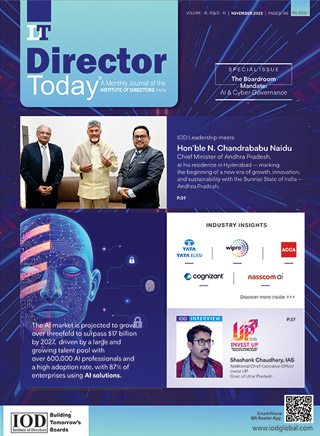Transformative Technologies and the Boardroom

Transformative Technologies, especially artificial intelligence (AI), are seen as agents of unparalleled technological and economic transformation. The significance of these technologies was also reflected at the G20 Summit, where the Prime Minister of India laid special emphasis on artificial intelligence to ensure inclusive growth. The Institute of Directors (IOD) has been at the forefront of promoting transformative technologies, both at the operational level and the boardroom level. Companies will be able to take on the world on their own terms by embracing such creativity and innovation. Embracing innovation and technology may spark profound changes all across the organisation, enabling ordinary men and women to achieve extraordinary results.
Transformative technologies have reshaped business operations. Adaptation to new technologies occurs at varying rates, but some of the slow starters are now truly leading the global market. Technological advancement mainly depends on how innovation is managed, and managing innovation is rooted primarily in leadership; effective leadership is critical to harnessing the full potential of new technologies while mitigating associated risks. Winning through innovation is about managing contradictions. Businesses place a high value on innovation because new ideas, products, and processes translate directly to better profitability and corporate growth. The Board's ability to navigate the rapidly changing technology landscape can determine an organisation's success in the digital age.
Working from home has become more common as a result of transformative technologies and digitalization, resulting in the development of a gig economy. A large number of higher-paid professionals accustomed to working online are getting drawn to the new ecosystem. Companies have recently discovered the effect of moonlighting, and their dilemma is whether to dismiss all such identified talented employees or to create an ecosystem where moonlighting is ethically permitted without hurting the work of the primary employer. Some of the forward-looking visionary boards have already developed SOPs that allow employees to moonlight without jeopardising their connection or business prospects with the primary employer.
The impression that transformative technologies merely improve the productivity of manufacturing or processing may be insufficient. Artificial intelligence is creating effective solutions for the environmentally friendly, paperless, and cyber-secure transfer of information and decisions in the boardroom. A number of technology solutions have been developed for fully secured online board meetings.
IOD is working on developing several innovative programmes for training and skilling the next generation of boards. The study of transformative technologies will necessitate easily understood presentations and explanations in order for the next generation of decision-makers to develop their abilities to make informed decisions. Understanding and utilizing transformative technologies in boardroom decisions has now become a commonplace, and perfection must be achieved. Various elements of transformative technologies and their applications have been covered by various experts in this special issue of Director Today. These articles will provide a comprehensive understanding and utilization of transformative technologies, including AI, cyber-security, and what boards can do to effectively make use of these technologies.
I hope this special issue of DT will effectively improve understanding of the board's role in transformative technologies amongst the readers.
Author

Lt. Gen. Surinder Nath, PVSM AVSM (Retd.)
President, Institute of Directors
former Chairman, UPSC
former Vice Chief of Army Staff and
former Independent Director, L&T Ltd.
He took over as the President of Institute of Directors with effect from 02 December, 2022
Owned by: Institute of Directors, India
Disclaimer: The opinions expressed in the articles/ stories are the personal opinions of the author. IOD/ Editor is not responsible for the accuracy, completeness, suitability, or validity of any information in those articles. The information, facts or opinions expressed in the articles/ speeches do not reflect the views of IOD/ Editor and IOD/ Editor does not assume any responsibility or liability for the same.

 Quick Links
Quick Links
 Connect us
Connect us




 Back to Home
Back to Home






























